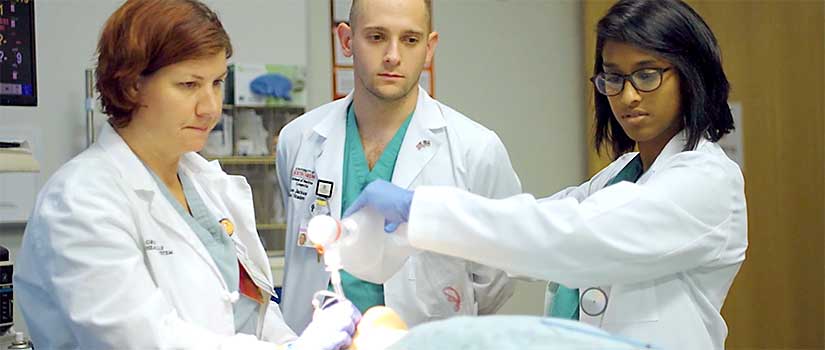The Integrated Practice of Medicine teaches you the art of medicine and what “good doctoring” is all about. These skills are critical to the practice of patient-centered care and essential to achieving our mission of improving outcomes for underserved populations in South Carolina.
Integration Across All Four Years
The IPM curriculum at the USC School of Medicine Greenville spans all four years of medical school.
IPM courses are year-long for the first two years. They consist of weekly paired sections — clinical reasoning “cases” and clinical skills — that show the real-world application of your weekly biomedical science studies. The classes also integrate aspects of social, behavioral and public health issues that affect patient care.
Third- and fourth-year IPM courses are one- to four-week sessions that enhance and reinforce principles of disease diagnosis and management as well as introduce advanced aspects of medical practice in preparation for your residency experience.
What can I expect each year?
IPM-1 and IPM-2 courses play an integral role in your M1 and M2 years. You and your peers are divided into small teams of eight to nine students and meet weekly with a clinical mentor from Prisma Health–Upstate.
This small group learning is designed to develop your clinical reasoning skills. You’ll hear pertinent case presentations and discuss them as well as explore case resolution based on that week’s underlying biomedical science lecture content.
The clinical skills component involves history-taking, physical examinations and skill performance. In your M-2 year, these sessions expand to include laboratory and imaging interpretation and diagnostic and therapeutic procedures.
Bedside ultrasound is carefully integrated into all four years to help you build a solid foundation in physical examination.
Behavioral, social, ethical and health science content is embedded in the reasoning and skills components to ensure you develop core competencies that you’ll build upon as the curriculum becomes more complex each year.
IPM-3 is a one-week course offered each spring to guide your transition into the real world of health care delivery.
Informed by your third-year clerkship experiences, you and your classmates will discuss the importance and application of topics, including quality and risk management, medical-legal issues, advanced diagnostics, lifestyle medicine and medical practice in the context of societal challenges.
The course also builds your proficiency in basic and advanced procedural skills.
The IPM-4 course, strategically scheduled after Match Day, reinforces curricular concepts to prepare you for your residency training program.
For the first two weeks, you will review core knowledge and clinical skills, practice procedures and undergo competency assessments. Then you’ll go through residency boot camp and receive training directly related to your specialty.
Like what you see? Apply now.
Applying to medical school is a big decision and we can help you navigate the Admissions process. Learn how to apply.
